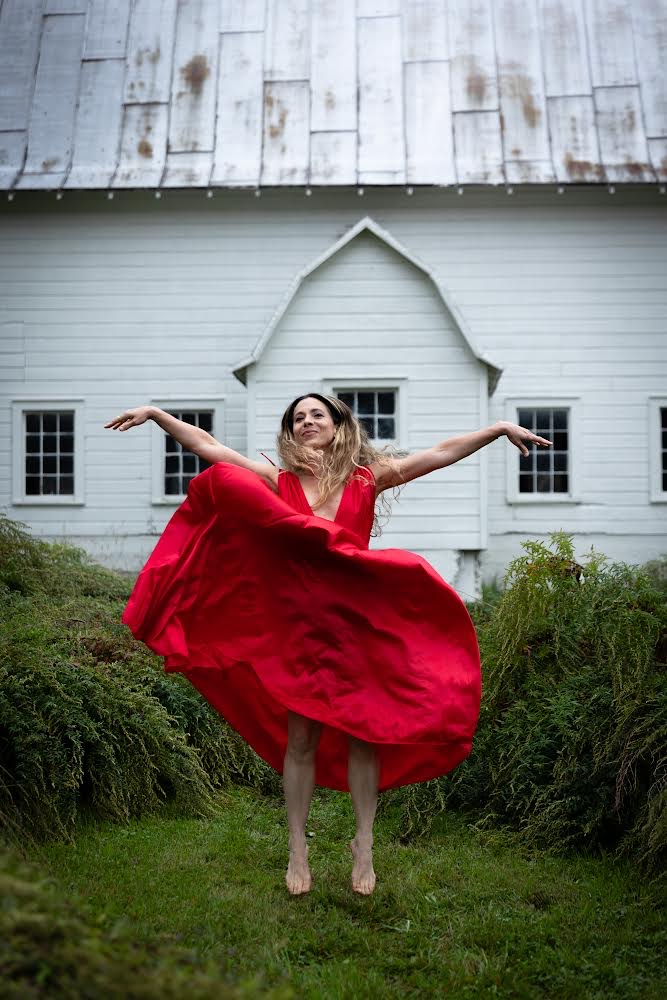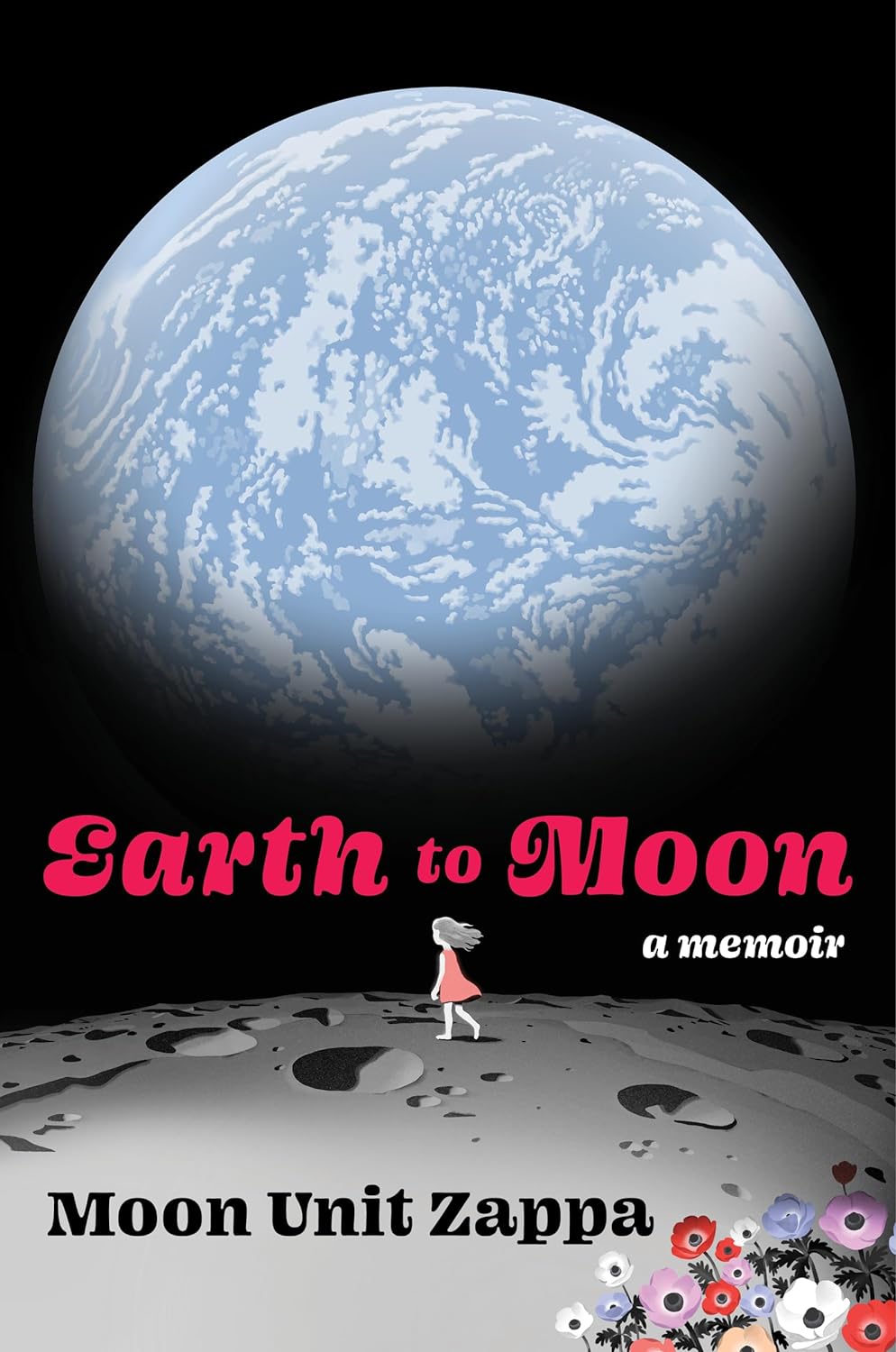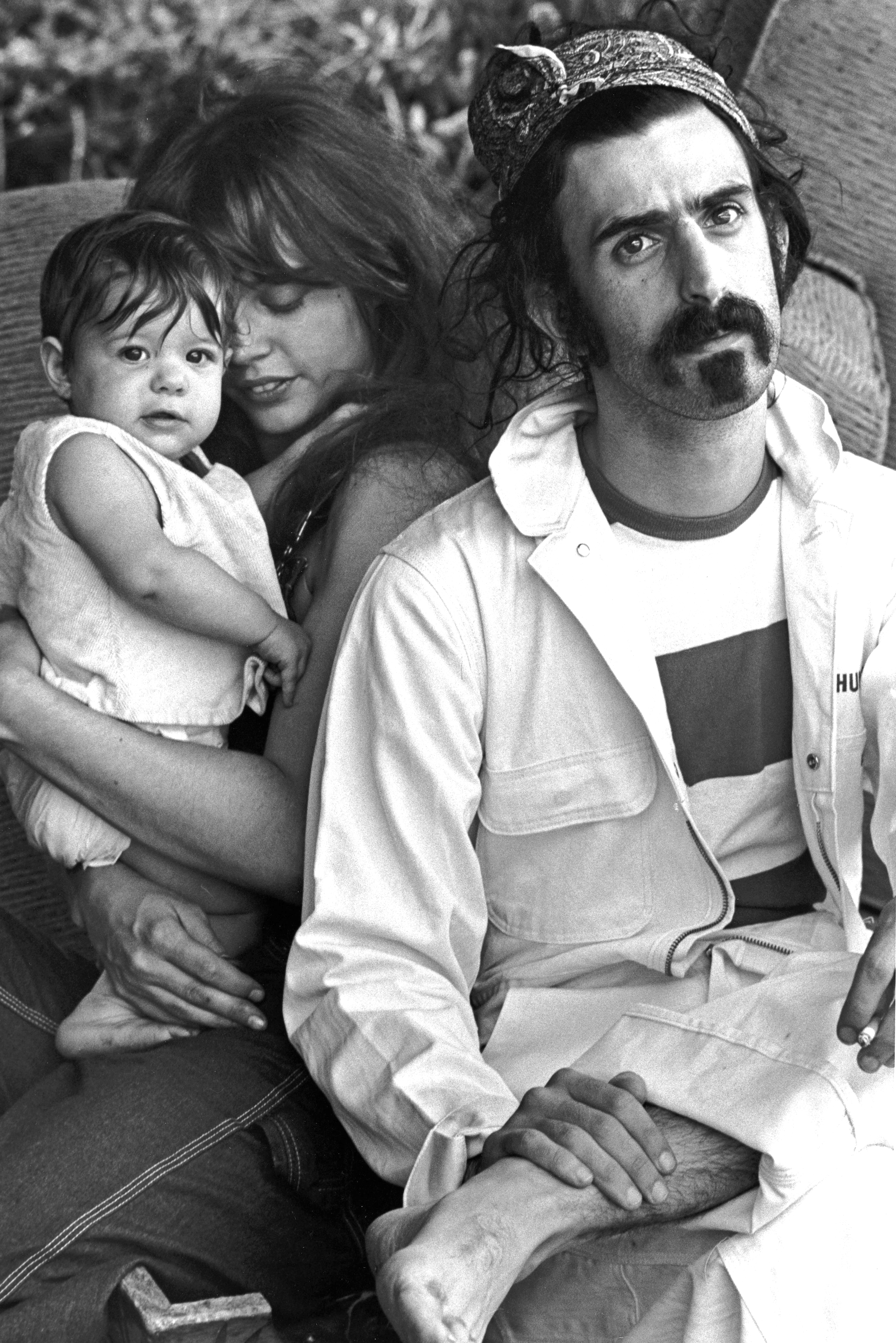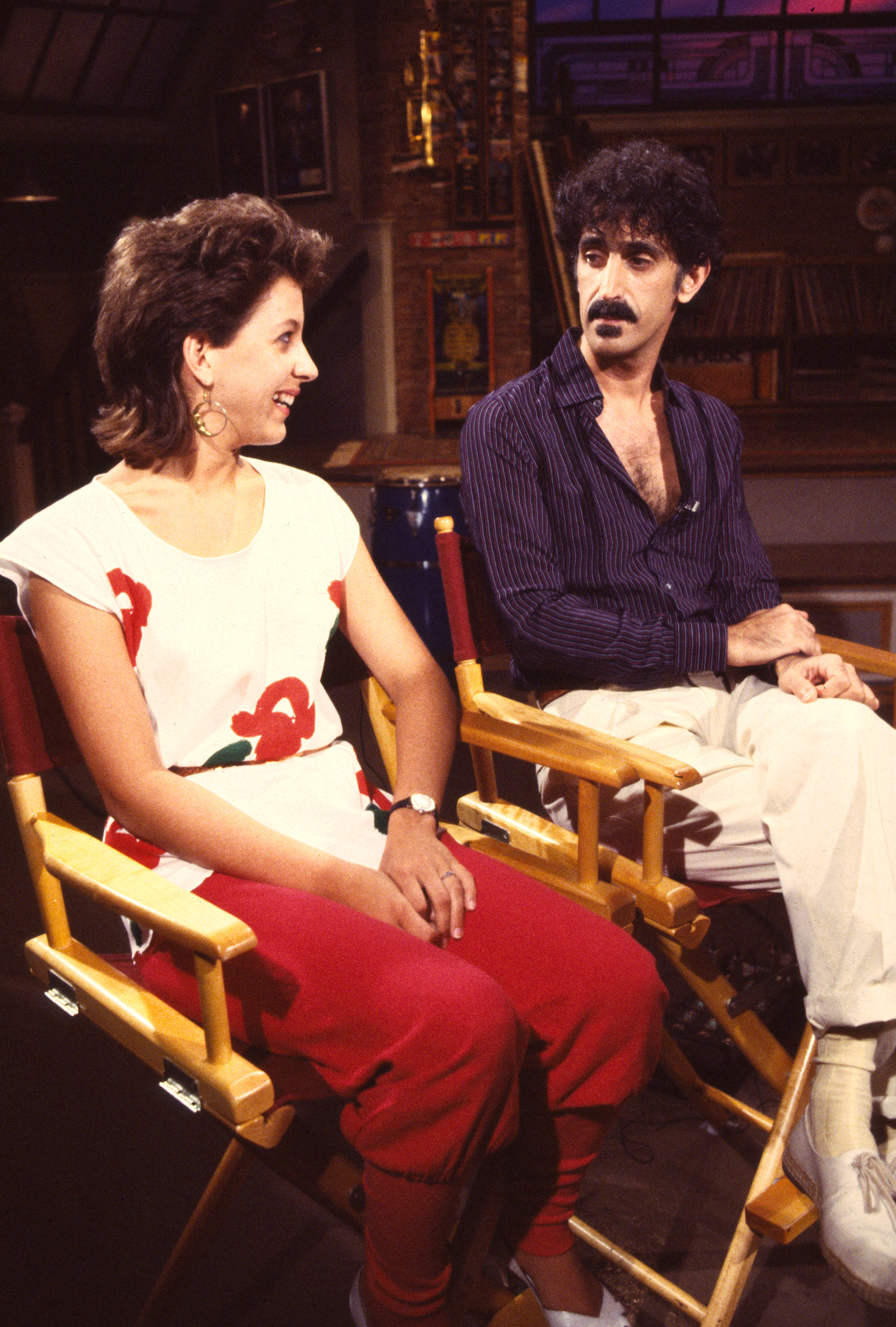
As I delved into the captivating narrative of Moon Unit Zappa’s life, I was struck by the profound complexity and raw emotion that permeated her experiences. Having read countless biographies and memoirs, I must say that hers stands out as one of the most intriguing and thought-provoking tales I have encountered.
Moon Unit Zappa remembers the moment she became the voice of a generation.
On an evening in 1982, during school hours, musician Frank Zappa stirred his 13-year-old daughter from sleep. He urgently needed her assistance at their home studio right away. This was Moon’s first visit to her father’s private domain – a place he spent most of his time when not on tour. According to her memoir, “Earth to Moon,” which is released tomorrow, her father uttered the significant phrase: “We’re going to record a song.”
In a hazy state, “with teeth unwashed,” Moon entered the soundproof vocal booth, adorned with headphones. These were offered to her, microphones were fine-tuned. A thrill of anticipation coursed through her body. It seemed that Frank had discovered the letter Moon had secretly placed beneath the studio door a few days earlier, a plea for an opportunity to contribute her “Encino accent” or “surfer dude talk” to his latest album. Since traditional communication was the only means Moon could devise to grab her father’s attention.
Now it was all happening.
Under the instruction to adopt a humorous tone, Moon assumed her role, as Frank encouraged her to incorporate phrases such as “gag me with a spoon” and “tubular.” The conversation ended swiftly. Delighted by her performance, Frank embraced Moon warmly before sending her back to rest.

In 1982, the recording turned out to be “Valley Girl” – an unexpected chart-topper. Even today, over four decades later, Moon’s unique Valley dialect continues to symbolize ’80s Southern California youth trend. Yet, it was this very event in her life that she found difficult to address in her memoir, explaining, “It was a tough period for me. I had to save that section for the end before I could write about it.”
Instead of a joyous victory for Moon, it turned into a cause of worry and mixed emotions, mirroring the tumultuous feelings of a child raised by two dominant and unpredictable narcissists who were not particularly fond of parenting. In contrast, Frank Zappa’s hit “Valley Girl” was solely his triumph, as it was the only one of his songs to reach the Top 40 charts.
In my perspective, Moon expresses that she faced a profound contradiction – at home, those closest to me dismissed my worth, while the wider world recognized me as witty, gifted, and amusing. This paradox was difficult for me to comprehend, especially when I learned that my parents had been withholding the royalties from my “Valley Girl” success.
Moon’s youth was dominated by intense negotiations about money, emotions, and time usage. Her father, a renowned multi-talented musician and iconic guitarist, was often absent due to his workaholic nature. On the other hand, her mother, Gail, was always around, but she was demanding and at times aggressive. Sharing a large home in Laurel Canyon with her father, three younger siblings (Ahmet, Dweezil, and Diva), and the constant flow of work and play for three decades, Moon had a hard time finding peace amidst the tumultuous atmosphere of her family life.

To put it another way, things didn’t unfold as expected in Gail Zappa’s life while her husband was constantly on tour. Instead, it seemed like a whirlwind or turbulent void. As Zappa stated, he never felt it was his story to share, and encouraged Gail to write it. However, upon her death, he found himself delving into the identities of these individuals. Moon’s memoir paints a picture of herself as an insecure and perplexed child, yearning for her distant father’s affection and seeking comfort from a mother who was more like a tormentor. She questions, “What do you do when your own mother is your first adversary?” She adds that growing up with such emotional trauma left her preoccupied with the thought of escaping.
The perpetually unfinished complex, adorned with oleander plants, discarded milk cartons, R. Crumb comic books, empty cups of tea and coffee, and ashtrays, frequently served as a residence for strangers frolicking or candle-making, according to Moon’s account. Zappa describes this experience as similar to being a child who rides in a car during a car wash. She was enjoying a late meal at Granville restaurant in North Hollywood, wearing a crystal necklace from her home in Taos, NM. “I felt secure within the bubble, observing the workings of my environment with awe,” she says. “However, there was an excessive amount of exposed bodies and commotion that I found overwhelming!” she concludes.
Gail nourished her children’s growing intellect with ideas about destiny, extraterrestrials, and the supernatural. She also used to tell them bedtime stories and occasionally shared her bed when Dad was absent; however, her acts of kindness were often overshadowed by her harsh temper. As Moon puts it, Gail lacked the skills to raise a family without causing chaos. “Gail relied heavily on my father in many aspects,” notes Zappa. “However, he traveled frequently, which leaves me with more understanding for her as an adult. If one doesn’t make efforts to grow personally, they will remain unhappy.”
Gail’s guiding philosophy was to allow Frank to carry out his tasks undisturbed, while she managed household conflicts as needed. This theme, something she grappled with frequently and served as the foundation for her book, was: ‘Is greatness justifiable if it causes harm to a family?’ As Zappa puts it, “This is what I call the Pharaoh Syndrome – you’re working for the top of the pyramid, and eventually, the consequences will come back to you.”

For Zappa, devising an exit strategy proved challenging, as the magnetic allure of family life frequently collided with her desire for a life separate from it. In her memoir, she recounts her struggle to capitalize on “Valley Girl’s” fame by embarking on an unstable acting career that, in hindsight, delayed her pursuit of higher education or conventional employment outside the entertainment industry. As she puts it, “I was ensnared in a blurred dreamlike state.” It never crossed her mind to venture beyond show business.
In 2015, Gail passed away due to lung cancer, twenty-one years following her husband’s demise. Despite decades of financial secrets kept from Gail, Frank Zappa believed his four children would inherit a fair portion of the estate and manage the business as their mother had done. Regrettably, Gail died heavily in debt. After the settlement, the house and majority of assets were given to Diva and Ahmet. This triggered a bitter legal dispute among the siblings, leaving an emotional rift that remains unhealed to this day.
Moon finds it hard to imagine that Gail would take such a stance, considering her decision to leave behind a disorganized situation, especially since there was an opportunity to tidy up before she passed away. To Moon, Gail seemed to misunderstand the situation as her children chasing an imaginary pot of gold. Gail felt Moon was pushing her out, but in truth, it was Gail who took away Moon’s capacity to mourn for her.
In Taos, Zappa has discovered a sense of tranquility amidst the stark grandeur of its mesas and snow-peaked mountains. She conducts meditation sessions and has launched her own brand of herbal teas. Although she continues to admire her father’s prowess (the book is dedicated to him), she is still grappling with her emotions concerning her parents. “Perhaps my story serves as a warning about growing up in the wake of a colossus,” Zappa notes. “Yet, it’s essentially about conquering an immense challenge and finding serenity.”
Moon Unit Zappa is scheduled to have a chat with author Ariel Leve at the Beverly Hills Public Library on August 22nd.
Read More
- Clash Royale Best Boss Bandit Champion decks
- Vampire’s Fall 2 redeem codes and how to use them (June 2025)
- Mobile Legends January 2026 Leaks: Upcoming new skins, heroes, events and more
- World Eternal Online promo codes and how to use them (September 2025)
- Clash Royale Season 79 “Fire and Ice” January 2026 Update and Balance Changes
- M7 Pass Event Guide: All you need to know
- Best Arena 9 Decks in Clast Royale
- Clash Royale Furnace Evolution best decks guide
- Best Hero Card Decks in Clash Royale
- Clash of Clans January 2026: List of Weekly Events, Challenges, and Rewards
2024-08-13 13:31